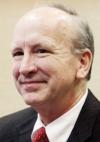Justice: Record speaks for itself
By Dennis Hill
Published in News on November 4, 2012 1:50 AM

State Supreme Court Justice Paul Newby
State Supreme Court Justice Paul Newby says his race for re-election to the state's highest court is about one thing -- whether or not he has done a good job over the past eight years.
Newby, who was elected in 2004, is seeking another term.
But in what is likely the highest profile judicial race on November's ballot, he faces a challenge from a lawyer with significant name recognition -- Sam J. Ervin IV, the grandson of the U.S. senator who led the Watergate hearings that prompted the resignation of President Richard Nixon 40 years ago.
Ervin has downplayed his name advantage, pointing out that few people under the age of 50 even remember his grandfather.
But in an interview with The News-Argus on Thursday, Newby noted that Ervin is using his full name on the ballot in an effort to jar voters' memories.
"For 56 years, he's been 'Jimmy,'" Newby said. "That's not going to be on the ballot anywhere. Why?"
Newby, 57, is a Republican. Ervin is a Democrat. The race, like all judicial races, is nonpartisan, but Newby said Ervin is running for partisan reasons. Four chief justices, two Democrats and two Republicans, have endorsed Newby for re-election -- Jim Exum, Rhoda Billings, Burley Mitchell and I. Beverly Lake. Ervin's entry into the race is what injected partisanship into the campaign, Newby said.
"I've shown no partisanship," Newby said. "So he clearly chose to run for partisan reasons. He ran because I am a Republican."
Name recognition is extremely valuable in a judicial race because so few people know the candidates. In fact, a recent poll shows most people in the state think justices are appointed, not elected. Newby said his challenge is to get voters to look at his record over the last eight years instead of pushing a button because they see the name Ervin.
"That's the challenge, to overcome that," he said. "That's why I have worked as hard as I have."
An expert on the state Constitution, Newby earned plaudits when he led an investigation that brought back to North Carolina a copy of the state Constitution that had been stolen by a Union soldier during the Civil War.
An adjunct faculty member at Campbell University School of Law, he was awarded the 2012 John McNeill Smith Jr. Constitutional Rights and Responsibilities Section Award from the North Carolina Bar Association.
Newby also has earned recognition for his stance on open government.
North Carolina has one of the weakest open government laws in the country. Newby said that too often, public officials forget that they are servants of the people. When the media tries to find out what local governments are doing, they can run into roadblocks put up by municipal or county officials who seem to believe that what they do should be done out of sight of citizens whenever possible.
That, Newby said, defies the meaning of the state Constitution. Local governments draw all their power from the state, he pointed out.
"When government says, 'It's our record,' well, no it's not, it's our (the public's) record. It belongs to us. Our people can only make wise choices when they have the full record and that means the full record of anything that may have gone on in any meeting, because they're entitled to it."
And that means the media have to have access to records, he said.
"The people's right to know goes hand in glove with the media's right to know," he said, "because the media are the people."
Newby said he is no lawmaker, that is not his job. But he said now is a good time for the state to strengthen its "sunshine" laws.
"There's no better time in history than now, from a policy perspective, to go to the Legislature and say 'We have had 100 years of darkness. Let's shine some light and let's don't go through this ever again.'"
He emphasized that he believes the court's role is not to set policy, but simply to apply the law that the lawmakers have created. He said his philosophy is judicial restraint, not judicial activism. But the court also is there to tell government when it has overstepped its bounds.
Across most of the world, the government dictates what citizens and the media can know. That is not the American way, he said.
"In 90 percent of the world, he government tells citizens what their rights are and the media what their rights are. But in America, our rights and freedoms are God-given. How dare you tell me you can't give me information about me."
Newby has been criticized by some for the amount of money he has received from Republican political action committees. But he said he has nothing to do with the committees and that the reason he has drawn so much support is that his record shows that he is a reasoned, impartial jurist.
"Quite frankly, all these PACs have coalesced because they see my opponent's partisanship and they want to help me overcome that structural barrier on the ballot and get some name recognition.
"I'm predictable. I'm consistent. I'm not a blank slate," Newby said. "That's why I have bipartisan support."
He also noted that Ervin has received PAC money.
Newby said he has not kept up with how much money has been raised for his campaign. He said he makes it a policy not to know who has contributed.
"When I put that black robe on, I don't want to know which lawyers gave money or who didn't," he said. "Lady Justice is blindfolded and that's the way it's supposed to be."
